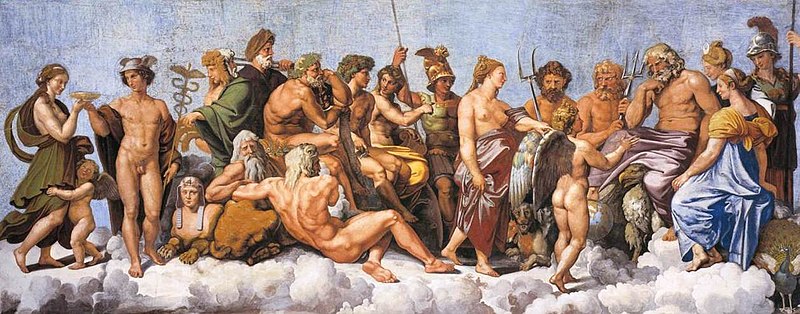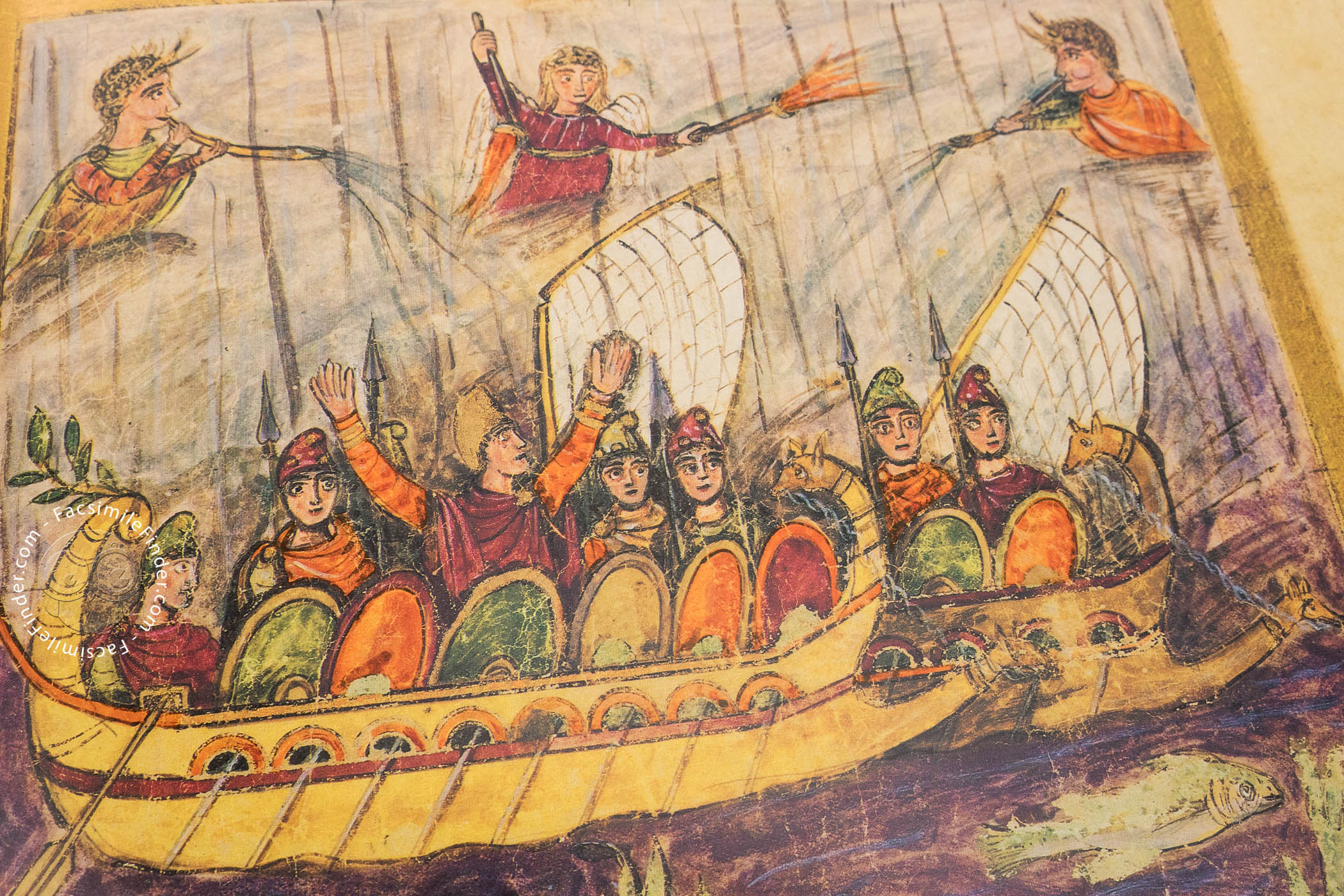The Aeneid, Book X
Overview Book I Book II Book III Book IV Book V Book VI Book VII
Book VIII Book IX Book X Book XI Book XII
First Battle
Jupiter summoned a council meeting of the gods reminding them he had forbidden the Latins and Trojans to clash. War would come in the future when Carthage crossed the Alps and invaded Italy. Venus and Juno both pleaded their case for Aeneas and Turnus respectively, Venus reminding Jupiter that the Trojans were in Italy because it was their destiny and so Turnus and the Rutilians should not be laying siege to them; she asked Jupiter’s permission to safely remove Ascanius from the fighting. Juno stated that no-one forced Aeneas to make war against the Latins; Turnus was only defending what was his; she did not start the Trojan war; she had only redressed the balance of the help given to Aeneas. Jupiter concluded the council by saying he would remain impartial in the war.

While the fighting continued Aeneas was sailing back with his new allies. Virgil lists the names of some of the thirty ships and some of the men in them. As Aeneas was steering his ship at night the nymphs, whom Cybele had metamorphosed from his ships, swam alongside. The nymphs’ spokesperson, Cymodocea, told Aeneas who they were, that Ascanius and the other Trojans were being besieged by the Latins and that Turnus was preventing the Arcadian horsemen joining them; Aeneas must hurry and fight using his invincible shield. She then propelled his ship forward and the other ships followed.
The next day Aeneas, standing on the ship’s stern so he could see the Trojans’ camp, held his shield high so that it flashed and this gave the Trojans renewed hope. Flames poured from the crest of his helmet and from the boss of his shield. Turnus, undeterred, with some of his men, went to the shore to repel Aeneas’ landing, encouraging his Rutilians by reminding them of past glory; others continued the siege of the camp. Aeneas and his men all landed safely except for those on Tarachon’s ship which ran aground and was then smashed by the waves. These Trojans, with Aeneas leading the slaughter, then had to face Turnus and his men on the shore. Both sides were evenly matched in the fighting.

Elsewhere Pallas seeing his Arcadians retreating, reproached them for running away and led by example by running into the thick of the enemy and quickly killing six men, thereby shaming his men into rejoining the fighting. Pallas was matched in age, strength and bravery by the Rutilian, Lausus. Jupiter, however, did not allow Pallas and Lausus to fight each other as they were both fated to die at the hands of a stronger enemy. Juturna told her brother, Turnus, to take the place of Lausus so that he could attack and kill Pallas, which he did as they fought in single combat. Pallas appealed to Hercules to help him in return for the hospitality Evander had showed him. Jupiter, however, did not allow Hercules to help Pallas as his allotted fate was due, just as Turnus’ was soon after.
Pallas threw his spear first but only grazed Turnus’ shoulder. Turnus’ spear went through Pallas’ shield and breastplate and into his chest. As Pallas pulled it out he died. Turnus gloated before they fought and after. This arrogance and the sword belt which Turnus took from Pallas’ dead body and kept would soon cost Turnus his life. Pallas died on the first day he fought in the war but with great glory having killed many Rutilians. Rumour of Pallas’ death reached Aeneas and he angrily killed many of the enemy in his path, impervious to all pleas for mercy, also capturing eight of the enemy whom he intended to sacrifice before Pallas’ funeral pyre.

Jupiter allowed Juno to withdraw Turnus from the fighting temporarily as long as she understood he was fated to die in this war. Juno made a substitute figure of Aeneas appear before Turnus which he followed as it ran away from the fighting and boarded a ship which Juno took out to sea, followed by Turnus. The real Aeneas meanwhile was looking for Turnus on the battlefield while Turnus, out at sea, prayed to Jupiter to return him to the fighting but Juno for the moment prevented him returning. Mezentius took Turnus’ place in the fighting and, like a mighty wild boar or a ravenous wild lion, he killed many of the Trojan enemy. Many men died on both sides overlooked and pitied by the gods.
Finally Aeneas and Mezentius met in battle. As Aeneas approached Mezentius lying wounded on the ground, Lausus, Mezentius’ son, stood between them and his comrades bombarded Aeneas with weapons so that Mezentius could withdraw, protected by Lausus’ shield. Aeneas challenged Lausus to fight and killed him with his sword. Mezentius meanwhile had escaped because of his son’s actions but when he saw his dead son’s body he mounted his horse, wounded as he was, and went to look for Aeneas. He rode round Aeneas three times hurling spears at him but Aeneas was protected by the shield made by Vulcan. Aeneas then killed Mezentius’ horse with a spear and it pinned Mezentius to the ground as it fell on him. As he begged to be buried with his son, Mezentius was killed by Aeneas’ sword.

